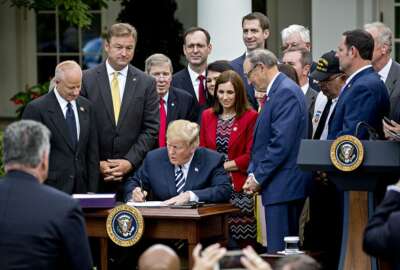

Lawmakers are still trying to find a permanent funding source for the VA MISSION Act, as the president publicly expressed his disagreement with some of the new...
Best listening experience is on Chrome, Firefox or Safari. Subscribe to Federal Drive’s daily audio interviews on Apple Podcasts or PodcastOne.
House and Senate lawmakers are wrapping up the appropriations process for the Veterans Affairs Department, which is set to receive another record-high budget in fiscal 2019.
The House cleared a $5 billion boost for VA, part of a package of appropriations bills members voted on Friday. The deal also included $1.1 billion for the Veterans Choice Program, which the recently-signed VA MISSION Act authorized. The MISSION Act authorized a total of $5.2 billion for VA to continue the Choice program for another year while the department implements new community care initiatives.
The Senate Appropriations Committee also sent its VA spending package to the floor this week.
But there’s still a few unresolved matters.
Members of Congress still haven’t fully figured out how they’ll pay for the new, consolidated community care program that the VA MISSION Act, which the president signed earlier this week, authorizes.
Unlike the previous Veterans Choice Program, the new community care program uses discretionary instead of mandatory funding, which means congressional appropriations committees will need to provide designated resources for veterans health care every year.
“The current budget agreement does not account for this expense, which is estimated to cost approximately $50 billion over the next five years,” Senate Appropriations Committee Chairman Richard Shelby (R-Ala.) said during Thursday’s markup. “Even more troubling is the return to sequestration levels in 2020 and the committee’s ability to fund the new programs under fiscal constraints.”
Both Shelby and Ranking Member Patrick Leahy (D-Vt.) said they were committed to finding a solution and were working with Senate VA Committee leaders Johnny Isakson (R-Ga.) and Jon Tester (D-Mont.).
Meanwhile, President Donald Trump, who touted the MISSION Act during Wednesday’s signing ceremony, has a few objections to some of the finer points of the new law.
The White House detailed them in a statement released hours after the MISSION Act signing. Oversight of VA’s implementation of the MISSION Act was never destined be simple, but Trump’s concerns indicate those tasks may be even more difficult.
First, the president is concerned by a specific direction in the MISSION Act, which said VA must get permission from House and Senate VA committee leadership before spending more than $50 million on certain pilot programs. VA is supposed to use these pilots to test new and innovative payment and service delivery programs.
But Trump directed the VA secretary to treat those provisions as “advisory and non-binding” — not a prerequisite for spending more than $50 million at a time on a pilot program.
Second, the president took issue with some of the details governing the board members who will sit on the Asset and Infrastructure Review (AIR) Commission. According to the MISSION Act, the president will consult with members of Congress to appoint members to serve on this commission.
These members will review VA’s assets and make recommendations for disposing of the agency’s under-utilized, outdated or vacant facilities — a practice that mirrors the controversial base-realignment and closure process.
Veterans service organizations had argued early on in the legislation’s drafting process that they have a seat at the table during the asset review, and they expressed some concern that the president — in early versions of the bill — would appoint the commission’s members.
House VA Committee Chairman Phil Roe (R-Tenn.), who originally championed the asset review process, worked with veterans service organizations to resolve their concerns and settled on the bill’s final language.
But Trump’s recent statement indicates there may be some unaddressed disagreements over the commission and its oversight.
“I anticipate that I will be able to consult with members of Congress on these appointments and will welcome their input, but a requirement to consult with the Congress in executive decision making violates the separation of powers,” Trump said in the statement.
Despite the uncertainty over the MISSION Act’s funding source, VA is still on track to receive a record-high budget next year — at least $5 billion over 2018 levels.
As it stands now, the Senate appropriations would fund the VA at more than $1 billion more than what the president had originally requested. The Bipartisan Budget Agreement, which Congress passed in March, gave appropriators more room to spend on VA infrastructure, claims processing and medical research.
The Senate version, for example, includes $87 million boost to the Veterans Benefits Administration for more staff.
The House-passed appropriations bill would set aside $1.2 billion for VA’s new electronic health record contract with Cerner. The bill also requires VA report regularly to Congress about the project’s timelines, performance milestones, costs and change management initiatives.
Rep. Gerry Connolly (D-Va.) also secured an additional $1 million for the VA inspector general in the House appropriations bill.
Copyright © 2025 Federal News Network. All rights reserved. This website is not intended for users located within the European Economic Area.
Nicole Ogrysko is a reporter for Federal News Network focusing on the federal workforce and federal pay and benefits.
Follow @nogryskoWFED


